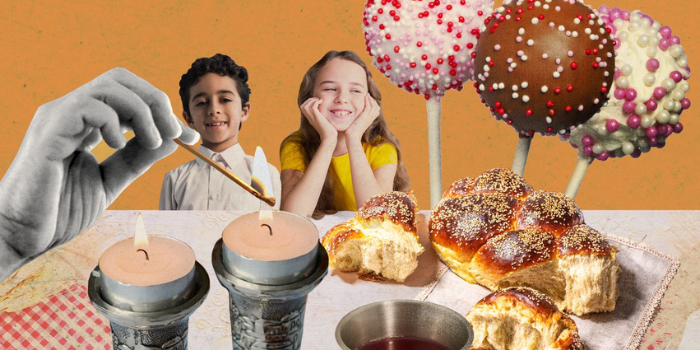Being Jewish
Commentary
Holidays
Shavuot
What if Ruth Didn’t Convert?

May I take a moment to suggest a controversial take on the Book of Ruth, which we read on the upcoming Shavuot holiday? According to the ancient rabbis, the eponymous Ruth was the first official convert to Judaism. She was born a Moabite and married into an Israelite family. She converted after her husband died, when her mother-in-law, Naomi, said that Ruth was free to return to her birth family, and Ruth begged to stay: “Where you go, I will go, and where you stay, I will stay. Your people will be my people and your God my God” (Ruth 1:16).
After a recent conversation I had with an interfaith family, I started to think: What if those Midrashic rabbis were wrong, and Ruth never actually converted? Would she be any less meaningful a contributor to the Jewish people if, instead, she had remained a non-Jew who made a commitment to building a Jewish home?
Carly and Ron live in Washington, D.C., with two small children. Carly is Jewish, but did not grow up with any substantive Jewish content. Ron grew up Christian, but now considers himself secular. Before they got married, they committed to having a Jewish home, because Ron wanted his children to grow up with a religion, and Carly insisted that if there was a religion, it was going to be Judaism. The Washington Jewish community, with its plethora of programming for people in their 20s and 30s, made it easy for them to connect. They participated in numerous communal events, synagogue services and even an organized trip to Israel. They learned and engaged, but their Jewish practice was always outside their home.
Once covid began, participation in Jewish activities ground to a halt, including attending Tot Shabbat at their local synagogue. Carly and Ron were nervous to “do Jewish” at home because they thought they would mangle the Hebrew and “were only 25 percent sure of which blessing goes in which order,” they told me. But they were missing Judaism and didn’t know what to do.
I suggested starting with Shabbat dinner, with the internet as their backstop. I told them that God didn’t care if they got the Hebrew right and that their children didn’t care whether they said the blessing over the candles before or after the blessing over the wine—they were just waiting for challah! (For the record, the blessing over candles comes first.)
Recently, as Shabbat was beginning, I received a text from Ron: “Rabbi Shira! We did our first make-our-own-Shabbat with cake pops and songs and blessings, and I feel 10,000 times better already. Thanks again!”
We live in a moment in which we are blessed with tens of thousands of non-Jewish partners like Ron who are willing to jump in and build a Jewish life. No one should expect it to be easy. Building a Jewish home takes time and emotional, spiritual and physical energy. The most meaningful and effective way to do that is also the most time-consuming—just to do it. Celebrate Shabbat and holidays, read Jewish content, build a kashrut practice that is right for you. It doesn’t matter if both partners are Jewish; it matters that they’re both doing the work to make Judaism happen.
While I welcome anyone who wants to convert to Judaism, including Ruth, what makes her my foremother is that she connected with the Jewish people and built a Jewish family, whether she had an official ceremony or not.
Building a Jewish home takes effort. And often, there’s a learning curve. But the return on investment over the arc of a lifetime is tremendous. It was true in the time of Ruth, and it is true today.
Rabbi Shira Stutman is co-host of Chutzpod!, a popular new Jewish podcast.










 Facebook
Facebook Instagram
Instagram Twitter
Twitter
Susanna Levin says
Statistics show that Jewish children of mixed marriages are more likely to marry out as well. If Ron wants his children raised Jewish, he should convert. Both he and Carly should undertake a serious study of Judaism. That way, they’ll know which b’rachah to say when and for what and what those b’rachot mean. They will add meaning to their lives and that of their children.
Edmund Case says
Susanna,
You entirely missed the point of Rabbi Stutman’s excellent essay. Marrying out is not a bad thing — your attitude that it is is part of the problem, that interfaith couples are not welcomed and included in Jewish communities. Ron apparently does want his children raised Jewish — and he doesn’t have to convert for that to happen. Yes, it would be nice to know the order of the b’rachot — but that’s not nearly the most important thing. Can’t you see and accept that Ron and Carly are already adding meaning to their and their children’s lives through doing Jewish?